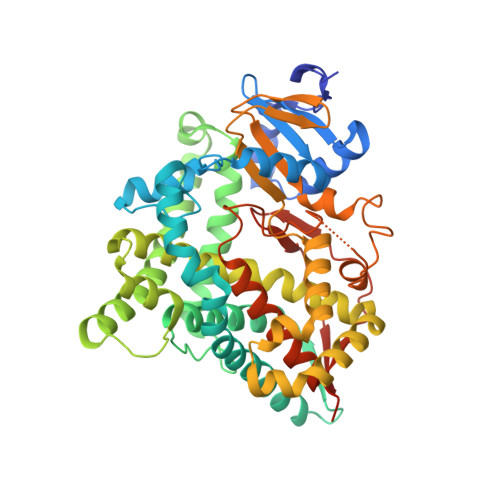Discovery of 3-Pyridyl Isoindolin-1-one Derivatives as Potent, Selective, and Orally Active Aldosterone Synthase (CYP11B2) Inhibitors.
Liu, Y., Wu, J., Zhou, M., Chen, W., Li, D., Wang, Z., Hornsperger, B., Aebi, J.D., Marki, H.P., Kuhn, B., Wang, L., Kuglstatter, A., Benz, J., Muller, S., Hochstrasser, R., Ottaviani, G., Xin, J., Kirchner, S., Mohr, S., Verry, P., Riboulet, W., Shen, H.C., Mayweg, A.V., Amrein, K., Tan, X.(2020) J Med Chem 63: 6876-6897
- PubMed: 32530624
- DOI: https://doi.org/10.1021/acs.jmedchem.0c00233
- Primary Citation of Related Structures:
6XZ8, 6XZ9 - PubMed Abstract:
Aldosterone synthase (CYP11B2) inhibitors have been explored in recent years as an alternative therapeutic option to mineralocorticoid receptor (MR) antagonists to reduce elevated aldosterone levels, which are associated with deleterious effects on various organ systems including the heart, vasculature, kidney, and central nervous system (CNS). A benzamide pyridine hit derived from a focused screen was successfully developed into a series of potent and selective 3-pyridyl isoindolin-1-ones CYP11B2 inhibitors. Our systematic structure-activity relationship study enabled us to identify unique structural features that result in high selectivity against the closely homologous cortisol synthase (CYP11B1). We evaluated advanced lead molecules, exemplified by compound 52 , in an in vivo cynomolgus monkey acute adrenocorticotropic hormone (ACTH) challenge model and demonstrated a superior 100-fold in vivo selectivity against CYP11B1.


















